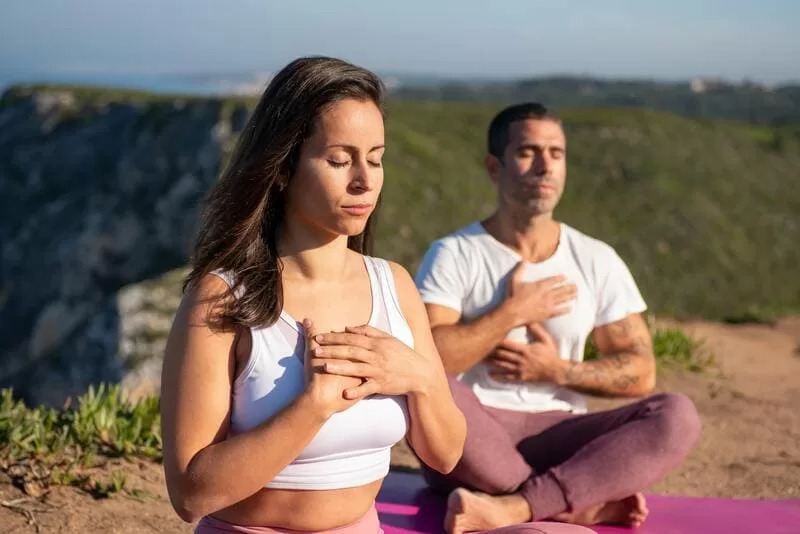You may ask, what is the difference between mindfulness and meditation? It is a common question and a valid one too. Meditation and mindfulness have become increasingly popular in recent years. More and more people are seeking ways to reduce stress, improve mental health, and find inner peace. These practices have ancient roots in various religious and spiritual traditions. But today they are practiced by people of all backgrounds. As people become more aware of the negative effects of stress and the importance of mental health, there is a growing recognition that these practices can have a positive impact on our well-being.
The difference between mindfulness and meditation is essentially technical. These practices share common ground, and hence, understanding their unique approaches can help us navigate the vast landscape of contemplative techniques more effectively. Let’s explore the various aspects that set meditation and mindfulness apart.
Comparing Meditation & Mindfulness
Meditation
Meditation is a practice that involves training the mind to focus and quiet the mental chatter in order to achieve a state of inner peace and relaxation. This is done through cultivating a deep sense of awareness and concentration. While there are many different types of meditation, the basic practice involves sitting quietly with a straight spine and focusing on a particular object, such as the breath, a word or phrase (a mantra), or an image (a mental object).

Mindfulness
Mindfulness is the practice of paying attention to the present moment with non-judgmental awareness. It involves cultivating a sense of curiosity and openness to one’s thoughts, feelings, and physical sensations as they arise in the present moment. The goal of mindfulness is to bring a sense of calm, clarity, and focus to one’s experience of the present moment, without getting caught up in thoughts and emotions.
Mindfulness can be practiced through a variety of techniques, such as the body scan, mindful eating, mindful walking, mindful breathing – and more. Mindful breathing exercises involve intentionally focusing on the breath, either by counting breaths or observing the sensation of the breath moving in and out of the body.

The modern world can be hectic and overwhelming, and mindfulness offers a process for slowing down, focusing, and finding peace in the midst of chaos. It can help shift focus from constant thoughts to the present moment with or without following the core meditation techniques. This can also be identified as a crucial difference between mindfulness and meditation.
Similarities and Difference Between Mindfulness and Meditation
Understanding the difference between mindfulness and meditation is important, because these are two distinct practices with different goals and techniques. Knowing the difference can help individuals choose the right practice for their needs and avoid confusion and frustration. Here are a few key differences between meditation and mindfulness:
Differences between Meditation and Mindfulness | ||
|---|---|---|
Focus | Meditation involves focusing on a specific object, such as the breath, a sound, or a visualization, to achieve a state of relaxation and inner peace. | Mindfulness involves being fully present and aware of the current moment without judgment. |
Goal | The goal of meditation is often to achieve a deep state of relaxation and inner peace. | The goal of mindfulness is to cultivate awareness and acceptance of the present moment, and to develop a non-judgmental attitude towards one’s thoughts and emotions. |
At the same time, both meditation and mindfulness are focused on betterment of a healthy mind and body. Can you now spot the difference between mindfulness and meditation? If so, here’s what similar in both practices:
Similarities between Meditation and Mindfulness | ||
|---|---|---|
Present moment awareness | Meditation techniques include focusing on a particular object, such as the breath, to bring attention to the present moment. | Mindfulness involves being fully present and aware of the current moment without judgment. |
Relaxation | Meditation can help calm the mind and induce a state of relaxation. | Mindfulness can reduce stress by helping individuals become more aware of their thoughts and emotions and manage them more effectively. |
Mind-body connection | Meditation can help individuals become more aware of bodily sensations and connect with their inner selves. | Mindfulness can help individuals recognize the connection between their thoughts, emotions, and physical sensations. |
Improved well-being | Both practices have been shown to improve overall well-being, including mental and physical health. Both practices have been associated with reduced symptoms of anxiety and depression, improved cognitive function, and increased feelings of calm and well-being. | |
‘Is Mindfulness The Same As Meditation?’ And Other Related Questions

As you have seen, the difference between mindfulness and meditation is technical. Meditation and mindfulness both are transformative practices that share common ground as they invite us to train the mind, foster concentration, and nurture awareness. They offer an array of advantages, including emotional regulation, and overall well-being. However, while their benefits may align, it’s crucial to acknowledge the differences between mindfulness and meditation. Here are answers to the most common questions regarding the similarities and differences between meditation and mindfulness.
Can You Meditate Without Mindfulness?
Yes, it is possible to meditate without mindfulness. While mindfulness is a common technique used in meditation to cultivate awareness and focus on the present moment, there are many other types of meditation that do not necessarily involve mindfulness. For example, some meditation techniques involve visualization, mantra repetition, or focusing on a particular sensation or object.
Which Is Better? Mindfulness or Meditation?
It is not accurate to say that meditation is better than mindfulness, or vice versa. Both practices have been shown to have numerous benefits for mental and physical health. The best practice depends on individual preferences and needs. Both techniques can be effective tools for managing stress, improving focus, and increasing self-awareness. Understanding the difference between mindfulness and meditation can help figure out what works best for you.
Can You Be Mindful Without Meditation?
Yes, it is possible to be mindful without meditation. Mindfulness is a state of being fully present and engaged in the current moment without judgment, and can be practiced in any situation. While meditation is a common technique used to cultivate mindfulness, there are many other ways to practice mindfulness, such as paying attention to your breath while walking, eating mindfully, or simply focusing on your surroundings in a non-judgmental way. However, always remember that there is a difference between meditation and mindfulness.
Is Mindfulness Just Buddhism?
No, mindfulness is not just Buddhism. While mindfulness has been a central practice in Buddhism for centuries, it is also a concept and technique that has been adopted by many other cultures and religions. In recent years, mindfulness has gained popularity in secular contexts as a tool for stress reduction, emotional regulation, and improved well-being. There are many different types of mindfulness practices that can be secular in nature and do not require any specific religious beliefs or affiliation.

Incorporating both meditation and mindfulness techniques into your daily routine can offer numerous benefits for your mental and physical health. While mindfulness can help you become more present and aware in the moment, meditation can help you cultivate a deeper sense of relaxation and focus. Understanding the key differences between meditation and mindfulness can help you tailor your approach to your unique needs and preferences. By using both practices together, you can develop a well-rounded approach to managing stress, improving focus, and enhancing your overall well-being.
Are you new to meditation and mindfulness? Sign up for our free live guided meditation sessions!






